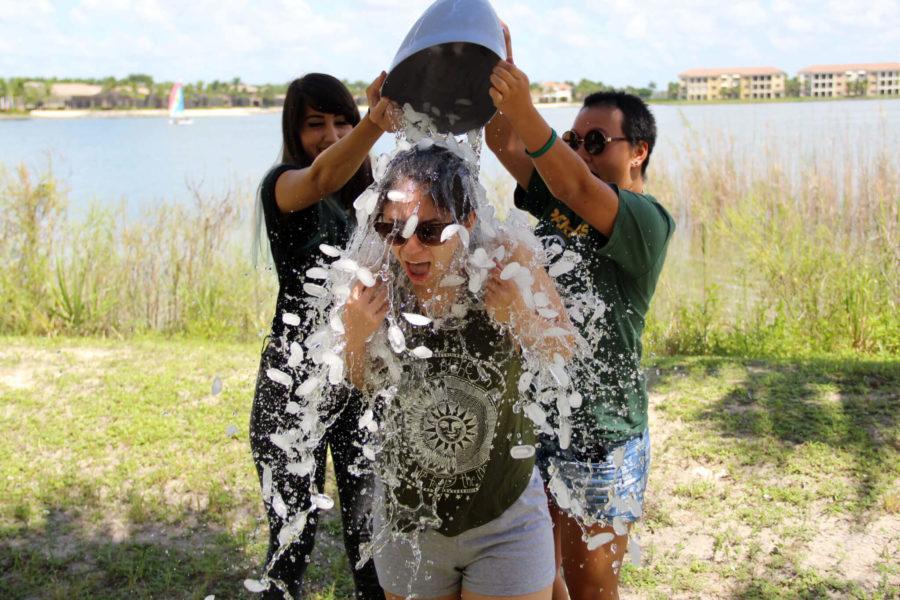A new video phenomenon has been blowing up social media in recent weeks. Millions of people have participated in the ALS Ice Bucket Challenge.
People record themselves dumping a bucket of ice water over their heads and then challenge others to do the same within 24 hours or they have to donate money to the Amyotrophic Lateral Sclerosis Association.
However, some people believe that those who do the challenge ignore the donation. Charles Peralta, a Florida Gulf Coast University junior and finance major, believes that those who do the challenge don’t actually donate when they say they will.
“People are cheap,” Peralta said. “It sucks but it’s true.”
Others think that people do actually donate money when they do the challenge. Rolner Alliance, an FGCU senior psychology major, thinks that people who do the ALS challenge donate as well.
According to the ALS Association, ALS (better known as Lou Gehrig’s disease) is a progressive neurodegenerative disease that affects the nerve cells in the brain and spinal cord. When the motor neurons die, the affected person loses control of muscle movement. This leads to difficulties eating, walking and breathing.
According to TIME magazine, the challenge started back on July 15 when Chris Kennedy from Sarasota, was challenged by a friend to do an ice bucket challenge. At the time, it had nothing to do with ALS. Originally, the participants got to choose which charity to donate to. Kennedy chose ALS because a relative had the disease. He then nominated his wife’s cousin whose husband had ALS.
Eventually, the challenge reached Pete Frates of Boston, who also had ALS. On July 31, Frates posted a video of himself doing the challenge and that’s when it really spread.
Since July 29, the ALS Association has seen a dramatic increase in their donations compared to this time last year. In July 2013, they raised $1.7 million. According to the New York Times, the Association raised $13.3 million this past summer. According to TIME, on August 18, the ALS Association reported that they had raised more than $15 million in donations since July 29. $8.6 million was raised on Aug. 19 alone.
At FGCU, men’s basketball coach Joe Dooley and faculty senate president Shawn Felton have posted videos of themselves performing the Ice Bucket Challenge and have challenged others to spread awareness of ALS.
Last week, President Wilson Bradshaw accepted the challenge from Dr. Jo Stetcher, director of the BSN Program in the School of Nursing. Since then, Bradshaw has challenged
Provost Ron Toll, Dr. Mitchell Cordova, dean of the College of Health Professions and Social Work, Athletic Director Ken Kavanagh, Women’s Basketball Coach Karl Smesko and Dooley. That group will participate in the challenge together on Wednesday, Aug. 27 at 2:30 p.m. in the Marieb Hall courtyard, according to a press release from the Office of Media Relations.
In a way, the Ice Bucket Challenge is definitely a phenomenon because it spread so quickly among social networks from Facebook to Twitter to YouTube. Hopefully, the challenge will continue to inspire people to donate to ALS and help spread awareness of this horrible disease. Until a cure is found, people are cooling off to reach out for victims of ALS.
ALS challenge cools off students, administration
August 27, 2014
Story continues below advertisement



































Meyer Odette • Jul 24, 2024 at 5:54 am
Last year, my 68-year-old partner was diagnosed with Lou Gehrig’s disease also known as ALS. Speaking and swallowing were two of his challenges. His collapse was swift and catastrophic, and neither the riluzole nor the medical staff did much to aid him. He would not have survived if our primary care physician hadn’t given him attentive care and attention, as the hospital center didn’t provide any psychological support. His fall was abrupt and catastrophic. His hands and legs gave way to weakness in his arms. This year our family physician suggested using vinehealthcentre. com ALS/MND treatment, which my husband has been receiving for a few months now. I’m delighted to say that the treatment greatly reduced and reversed his symptoms of ALS, he no longer requires a feeding tube, sleeps soundly, works out frequently, and is now very active. In the hopes that it could be useful, I thought I would relate my husband’s tale; in the end, you have to do what suits you the best